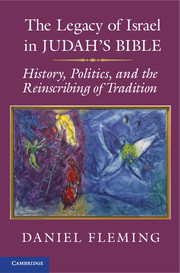Book contents
- Frontmatter
- Contents
- Preface
- Acknowledgments
- List of Abbreviations
- Part I Introduction
- Part II Israelite Content in the Bible
- 3 Writing from Judah
- 4 An Association of Peoples in the Land (The Book of Judges)
- 5 The Family of Jacob
- 6 Collective Israel and Its Kings
- 7 Moses and the Conquest of Eastern Israel
- 8 Joshua and Ai
- 9 Benjamin
- 10 Israelite Writers on Early Israel
- Part III Collaborative Politics
- Part IV Israel in History
- Bibliography
- Index of Biblical Texts
- Index of Near Eastern Texts
- Subject Index
5 - The Family of Jacob
Published online by Cambridge University Press: 05 August 2012
- Frontmatter
- Contents
- Preface
- Acknowledgments
- List of Abbreviations
- Part I Introduction
- Part II Israelite Content in the Bible
- 3 Writing from Judah
- 4 An Association of Peoples in the Land (The Book of Judges)
- 5 The Family of Jacob
- 6 Collective Israel and Its Kings
- 7 Moses and the Conquest of Eastern Israel
- 8 Joshua and Ai
- 9 Benjamin
- 10 Israelite Writers on Early Israel
- Part III Collaborative Politics
- Part IV Israel in History
- Bibliography
- Index of Biblical Texts
- Index of Near Eastern Texts
- Subject Index
Summary
The books of Judges and Genesis are ultimately founded on similar visions of Israel's political character as an association of distinct peoples. In Judges, the assumption of such an arrangement is visible especially in the core tales that involve collaboration or confrontation between groups, as in the Song of Deborah (Judg. 5:14–18) and the Ephraim/Gilead conflict (12:1–6). While the Judges tales take for granted the decentralized association, and none of them offers a formal explanation for their relationship, the Jacob story in Genesis accounts for Israel's unity through the bond of brotherhood. For the ancient Near East, this explicit account of a tribal association as sons of one ancestral father is rare, perhaps even unique. Neither the well-documented peoples of the second-millennium Mari archives nor the variety of first-millennium references to Arameans and Chaldeans are characterized by clear relations of brotherhood, as supplied by the Genesis genealogy.
The most detailed indigenous writing that relates to these social structures is found in the royal correspondence of the Mari archives from early second-millennium Mesopotamia. In this material, large-scale groups that act as politically independent players are not always defined by cities or “lands” (Akkadian mātum), and their membership may transcend the boundaries of entities defined by settlements. It is useful to call such groups “tribes” (see Chapter 13 on Amorites). At Mari, the best-documented division is unified in a spatial scheme, as Sons of the Right Hand (Binu Yamina) and Sons of the Left Hand (Binu Sim'al). At Mari and beyond, one may occasionally speak of “brotherhood” (aḫḫūtum/atḫūtum), but this is applied to any political relationship that could be set in the metaphor of the nuclear family, with allied kings or peoples thus rendered “brothers.” I am not aware of cuneiform evidence for any allied peoples who understood themselves to be literal brothers in a genealogical system such as that of Genesis.
- Type
- Chapter
- Information
- The Legacy of Israel in Judah's BibleHistory, Politics, and the Reinscribing of Tradition, pp. 72 - 90Publisher: Cambridge University PressPrint publication year: 2012



